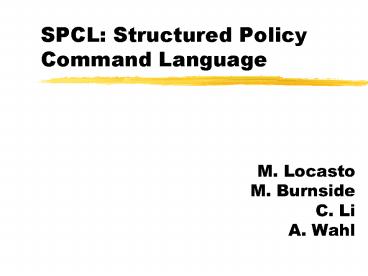SPCL: Structured Policy Command Language - PowerPoint PPT Presentation
1 / 12
Title:
SPCL: Structured Policy Command Language
Description:
SPCL: Structured Policy Command Language M. Locasto M. Burnside C. Li A. Wahl Motivation & Contributions Create a policy language that makes policy specification easy ... – PowerPoint PPT presentation
Number of Views:120
Avg rating:3.0/5.0
Title: SPCL: Structured Policy Command Language
1
SPCL Structured Policy Command Language
- M. LocastoM. BurnsideC. LiA. Wahl
2
Motivation Contributions
- Create a policy language that makes policy
specification easy natural - Separate policy specification from policy
enforcement
3
Language Overview
- Main elements zone, policy, object, principal,
group, action - basic rule
- allow deny action on object by principal
- optional clauses
- - when
- - side-effects rule update
- Precedence principal, group, default
4
(No Transcript)
5
(No Transcript)
6
Test Plan
- Language AND platform
- must test correctness of each component
- SPCL -gt Intermediate format
- Intermediate format -gt Policy decisions
7
Test Plan (cont.)
- Hierarchical
- each stage
- Compiler and PE individually
- Compiler and PE together
8
Test Suite
- Makefile-based test suite
- zone Empty
- policy Allow
- default
- allow
- Zone housepolicy MyPolicy default
deny object tv string
channel actions
action watch watch
principal Matt allow watch on tv
when ( tv.channel ! MTV )
9
Test Suite (cont.)
- import spcl.data.
- import java.util.
- import java.io.
- public class EmptyAllowInstaller extends
PolicyInstaller - public EmptyAllowInstaller( )
- public void doInstall() throws PolicyException
- if (nullpolicyLoader)
- throw new PolicyException("No policy loader
defined.", - PolicyException.NULL_LOADER)
- final Zone zone new Zone( "Empty" )
- final Policy policy new Policy( "Empty.Allow"
) - final Principal default_p new Principal(
"default_p" ) - policy.setDefaultPrincipal( default_p )
10
Runtime Environment
- PolicyEngine
- assume some network architecture objects defer
to PolicyEngine for decisions - primitive types
- Implementation
- Java sockets, own ClassLoader, command-line
client application
11
Model of Computation
- computation is Prolog-like
- search rule base
- unification resolution
- order of precedence
- side effects (unique interesting)
- Sample Query
- can principal do action-regex with
condition-bindings
12
Conclusion
- SPCL separates policy specification from policy
enforcement - SPCL provides a natural form for policy
expression - Project was a great learning experience for
everyone, we were able to work very well
together. - Take questions































